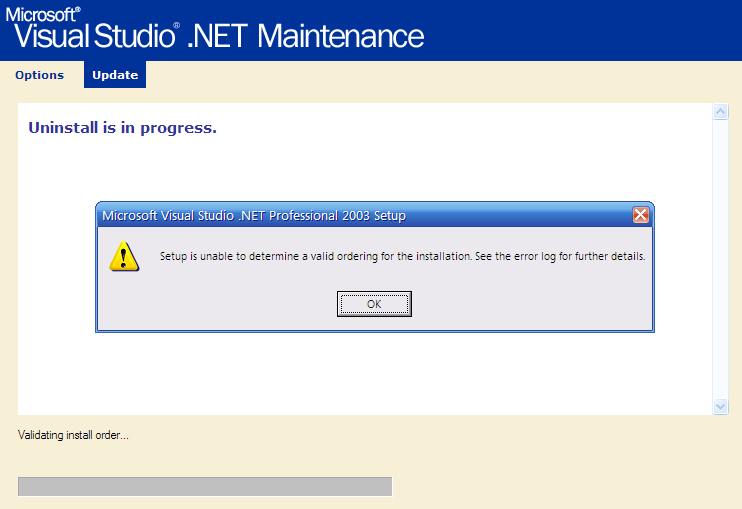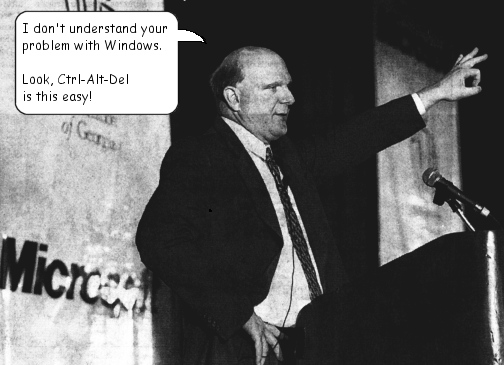This used to be a series of blog posts but now it is a shared Google Doc.
Link: I hate knobs
Areas of Interest, as counted by my cat
This used to be a series of blog posts but now it is a shared Google Doc.
Link: I hate knobs
I can’t believe this is actually true: http://blogs.zdnet.com/Bott/?p=84
The attitude expressed by the MSFT representative, however, I can totally believe.
I got the first WGA update through the Windows Update process – I manually review all the suggested updates but like most people I had no clue what WGA was doing. I have not accepted the later update to WGA, and I have actually removed these files from my SYSTEM32 directory:
wgalogon.dll
wgatray.exe
wgatray.exe-0ED38BED.pf
So far, they haven’t come back but that probably doesn’t mean anything. I can still reboot, browse the internet, and get email.
However, when I launch Windows Update (the application) from the Start menu or IE’s Tools menu, I am instructed that I must first install WGA.
Interestingly, if I configure Windows Update (the system tray icon) to warn me when updates are ready, it appears that from there, I can select to install updates – and they apparently install successfully.
So as they say, “Go figure”.
All I’m trying to do is uninstall 600 MB of un-runable stuff. There are not enough swear-words in the English language to cover this possibility:

…What error log, exactly? Any hints? There are many, many error logs.
Thank you, RegSeeker, CCleaner, and Process Explorer. My friends. Where would I be without you? Oh, that’s right. Screwed.
Have I recommended this blog before?
It’s really very good. It makes Marketing seem interesting.
It’s really better to be a pessimist than an optimist. I think pessimists get a bad rap. Sure, everyone likes the idea of being upbeat and happy. But it’s not a good survival perspective. Problems only get solved because people worry about them.
David Brin answered the critics of the pre-millennium Y2K disaster theorists by saying that it was a classic case of a self-defeating prophesy. I agree with him. If everyone had just said, “She’ll be right, mate” and done nothing at all about the problem, then almost certainly IT departments everywhere would have been extremely busy and stressed come Jan 1, 2000. (You just know that’s an understatement.)
Good programmers are pessimists. They have to be – they learn to be very early in their career.
“That will never work, you know.”
“Why not? I’ve debugged it, it runs fine. I’ve tested it. I’m a good programmer…”
“What about more than one user running that screen at a time? What about a user who stays in that screen overnight while your midnight triggers are running? What about machines with no audio card? No installed printer? You’re doomed.”
“Why, I’ll show you, you… you… big fat pessimist, you.”
I know very few people actually read this, but I am compelled to write anyway. There is currently some controversy erupting among web content authors about a feature in Google’s upcoming toolbar AutoLink offering. Apparently the toolbar has a button on it that, if the user chooses to click on, will parse the current browser content and add additional hyperlinks to the page, things such as map references or ISBN lookups, etc.
This seems to have selected eminent bloggers up in arms on either side of the argument.
Dave Winer writes, negatively:
The AutoLink feature is the first step down a treacherous slope, that could spell the end of the Web as a publishing environment with integrity, and an environment where commerce can take place.
Cory Doctorow writes, positively:
I think I should be able to use a proxy that reformats my browsing sessions for viewing on a mobile phone; I think I should be able to use a proxy that finds every ISBN and links it to a comparison-shopping-engine’s best price for that book across ten vendors. I think I should be able to use a proxy that auto-links every proper noun to the corresponding Wikipedia entry.
And so on — it’s my screen, and I should be able to control it; companies like Google and individuals should be able to provide tools and services to let me control it.
Tim Bray writes a pretty good summary of the situation, concluding:
There just isn’t that much fodder out there for AutoLink to get its teeth into. I haven’t had much time to think about it, but maybe it’s because most people who publish an address or ISBN or whatever that they actually care about take the time to link it to something useful. So, it’s not a game-changer. But it’s still evil.
I have been saving web pages to my local hard disk, editing them, and re-viewing them for some time. Sometimes I even add my own hyperlinks. The content writers can’t stop me from doing this, if I choose to do it. The Google Toolbar AutoLink feature is essentially doing the same thing – remember, I – the user – have to decide to install the toolbar, then browse around the web, and then when I’ve found a page that looks interesting, I have to consciously decide to push the “AutoLink” button to add the additional hyperlinks. I could do this myself if I had infinite time and patience, so what’s the big deal? It’s not like Google is republishing the altered content without the consent of either the author or the viewer. Calling it evil is a bit much.
Whether or not this is a good trend for the web as a whole, I don’t know.
Let me contrast this with something else.
You may have noticed some web sites seem to have weird links in them, that have a double-underline instead of the normal single underline. When you hover your mouse over them, you get an obnoxious popup tool tip with “Sponsored Link” and a bunch of other words. You probably need Javascript to be enabled as well, I don’t really know, I haven’t looked that closely.
This technology is called IntelliTxt by the company that is pushing it. (I won’t link to them – not even with rel=no_link or whatever that Google-juice suppressant thing is – but they call themselves Vibrant Media, a pioneer in contextual keyword advertising.) I’m sure the web site content owner has invited them to insert their links into the page in return for a share in the advertising revenue. For all I know, someone gets a kickback every time I hover my mouse over the link.
Now, in my opinion, Vibrant/IntelliTxt aren’t evil either, but they are giving me, the end user, a negative browsing experience.
But that’s ok. I use the FireFox browser with the AdBlock plug-in, and I’ve told it to ignore anything that matches the filter “*.intellitxt.com/*” and since then I haven’t seen the pesky links. The web site owner probably isn’t getting any revenue from Vibrant due to my choice to render their links invisible, but that’s a risk they have to take. They don’t own my eyeballs.
You see, we don’t get to have it only one way. If we get to keep our AdBlock plug ins to suppress crap like IntelliTxt, then Google gets to offer their toolbar AutoLink feature. Either way, the web gets richer and more interesting, in my opinion.
Update: I see now that Yoz Grahame made the same point last week.
By now, you probably know that:
The licensing bit has some folks upset. You can tell by the outrage that people are passionate about this product. And the outrage is understandable to an extent. Movable Type has been free for personal use since day 1. Now they’re asking the majority of their users to pay for something that many of them have never had to pay for to begin with. There is bound to be some backlash about that. [..] Some go so far to say, “Six Apart has gotten greedy!”. No, they haven’t. They are a growing company. Growing a company takes dollars. This is no volunteer organization, you know. They have real-world bills to pay. Ben and Mena have poured everything they have into their products. And for nearly three years, they’ve given it away. That’s not greed – that’s generosity. Now they are charging for their product (what a concept!), something they had a right to do with their first release.

When Microsoft finally resigns itself to being broken up, I recommend that they form the following two companies: Windows.com and Office.com. They already own the windows.com domain name, and I imagine that they could obtain the office.com one for an insignificant sum of money. Thanks to their brilliant marketing machine, most users of Office and Windows don’t actually know that they are Microsoft products anyway. (Overheard on the phone to an office administrator: “You mean Windows NT is a Microsoft product? I didn’t know that!” I swear this actually happened.) I would like to browse business.office.com for Word, Excel, etc, and developer.office.com for the MSDN / Visual Studio products.
© 2024 More Than Four
Theme by Anders Noren — Up ↑
Recent Comments